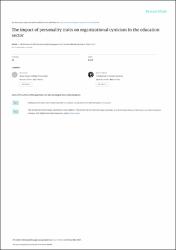| dc.contributor.author | Acaray, Ali | |
| dc.contributor.author | Yıldırım, Seda | |
| dc.date.accessioned | 2020-12-19T19:49:02Z | |
| dc.date.available | 2020-12-19T19:49:02Z | |
| dc.date.issued | 2017 | |
| dc.identifier.citation | Acaray, A. & Yıldırım, S. (2017). The impact of personality traits on organizational cynicism in the education sector. World Journal of Entrepreneurship Management and Sustainable Development, 13(1), 65-76. https://doi.org/10.1108/WJEMSD-12-2015-0051 | en_US |
| dc.identifier.issn | 2042-5961 | |
| dc.identifier.issn | 2042-597X | |
| dc.identifier.uri | https://doi.org/10.1108/WJEMSD-12-2015-0051 | |
| dc.identifier.uri | https://hdl.handle.net/11436/2209 | |
| dc.description | Yildirim, Seda/0000-0003-4367-6652 | en_US |
| dc.description | WOS: 000398862600006 | en_US |
| dc.description.abstract | Purpose - Today's organizations try to keep their employees loyalty but employees may still feel unsatisfied and adopt negative attitudes. Cynicism, as a negative attitude of employees toward their organization, leads to unwanted outputs such as lower performance or lower loyalties that can appear in every kind of sector. Accordingly, the purpose of this paper is to determine the effects of personality traits on organizational cynicism in the education sector. Design/methodology/approach - This study used the survey method to collect data and survey forms were distributed to teachers from various private schools in Istanbul, Turkey. With the e-mail survey method, the authors received 254 healthy survey forms from teachers. For personality traits, the five-factor model of personality traits that was developed by McCrae and Costa (1987) was preferred and the organizational cynicism model was evaluated with three basic dimensions as based on Brandes's (1997) model. Findings - Based on data from 254 teachers of various private schools in Istanbul, interrelationships amongst personality traits and organizational cynicism were tested. on the basis of the partial least-squares method, the authors found that agreeableness had a negative effect on cognitive cynicism and affective cynicism, conscientiousness had a negative effect on cognitive cynicism and affective cynicism, neuroticism had a negative effect on cognitive cynicism and behavior cynicism, and openness to experience had a positive effect on cognitive cynicism and affective cynicism. Thus, it can be said that personality traits of teachers had a significant effect on organizational cynicism as a result of this study. Research limitations/implications - This study used two main scales: the scale of McCrae and Costa (1987) for personality traits and the scale of Brandes (1997) for organizational cynicism. the authors adapted both the scales for Turkish culture and the education sector that the results can be considered valid for only this study. Originality/value - This study shows a significant effect of personality traits on cynicism in the education sector and thus can be considered to be useful for future studies. | en_US |
| dc.language.iso | eng | en_US |
| dc.publisher | Emerald Group Publishing Ltd | en_US |
| dc.rights | info:eu-repo/semantics/openAccess | en_US |
| dc.subject | Personality | en_US |
| dc.subject | Personality traits | en_US |
| dc.subject | Organizational cynicism | en_US |
| dc.subject | Cynicism | en_US |
| dc.subject | Education sector | en_US |
| dc.title | The impact of personality traits on organizational cynicism in the education sector | en_US |
| dc.type | article | en_US |
| dc.contributor.department | RTEÜ, Fındıklı Uygulamalı Bilimler Yüksekokulu, Finans ve Bankacılık Bölümü | en_US |
| dc.contributor.institutionauthor | Acaray, Ali | |
| dc.contributor.institutionauthor | Yıldırım, Seda | |
| dc.identifier.doi | 10.1108/WJEMSD-12-2015-0051 | |
| dc.identifier.volume | 13 | en_US |
| dc.identifier.issue | 1 | en_US |
| dc.identifier.startpage | 65 | en_US |
| dc.identifier.endpage | 76 | en_US |
| dc.relation.journal | World Journal of Entrepreneurship Management and Sustainable Development | en_US |
| dc.relation.publicationcategory | Makale - Uluslararası Hakemli Dergi - Kurum Öğretim Elemanı | en_US |


















